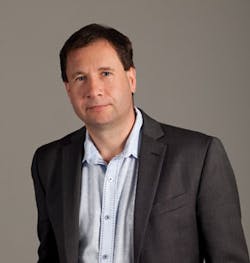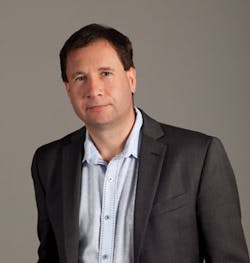Staffing business goes global
AN INTERVIEW WITH TOBIAS READ, CEO, SWIFT WORLDWIDE RESOURCES
EDITOR'S NOTE: Founded in 1984 with small offices in London and Aberdeen and a team of five employees, Swift Technical Services (now Swift Worldwide Resources) has become a global oil and gas service provider with more than 300 staff employees and 3,000 contract consultants across 35 countries. Swift recently relocated its global headquarters to Houston from London. Tobias Read, the company's chief executive, stopped by OGFJ's offices to discuss the company's plans and to explain why he made the move.
OIL & GAS FINANCIAL JOURNAL: Can you describe the services that Swift provides to the global oil and gas industry?
TOBIAS READ: Swift is a premier oil and gas manpower provider that offers a first-class service to all our customers. We specialize in the recruitment of contract and direct-hire positions for our clients, and we also recently started an executive service division, Hunter Pierce Associates, which specializes in recruiting oil and gas executives. Additionally, Swift offers a variety of services to our contractors such as benefits packages, visa and travel assistance, and payroll support.
OGFJ: Who are your clients? E&P companies, oilfield service companies, drilling contractors, geophysical companies, etc.?
TR: Swift started out dealing with only the major operators. However, we are increasingly working with midstream, downstream, oilfield service, and EPC companies. Primarily, most of our clients are related to upstream activities.
OGFJ: What level of staffing services do you provide for your clients?
TR: Full service to the highest quality to the highest level. This is our differentiator. We go above and beyond to make sure every detail is taken care of so that our clients do not have to worry about anything. For instance, we set up a drug testing site on campus for one of our clients so that contractors were away from work for less time. We are willing and ready to do whatever it takes to make things simpler for our clients.
OGFJ: How big (in terms of people) are your largest contracts? How long do contracts last, on average? Give us a sense of the scope of the jobs Swift works on. Do you find it to your advantage to have offices around the world? Why?
TR: For our biggest clients we have placed up to 1,000 people, and for the biggest projects up to 500 people. Our longest client contract has been in place for 30 years and was the reason the company was started. The longest project contract is about 10 to 15 years. We work on many of the world's biggest investment projects globally, which are often across multiple sites and multiple countries. Providing a global infrastructure is essential because people want a single seamless global service.
OGFJ: How has staffing in the oil and gas business changed in the past 20-30 years?
TR: It has dramatically changed, and it is hugely more exciting now. Staffing has gone from being a relatively local business to a truly global business where the Internet has been the enabler. The liquidity of manpower is now global on a much more industrial scale. The size and scope of projects is far greater now than it was 20 years ago with a huge demand for temporary and direct labor.
OGFJ: What went into your decision to move Swift Worldwide's headquarters from London to Houston?
TR: Houston is one of the world's major energy capitals where over half the jobs in the city are energy-related. It has increasingly become the global center for the majority of oil and gas decisions. Most of our major clients are headquartered in Houston, and it is beneficial for Swift's senior executives to be here in order to engage more directly and constructively with our senior clients.
OGFJ: What can a contractor expect when he or she decides to work with Swift?
TR: To be treated like a member of a close family. We believe in going above and beyond to make our "Swifties" feel special by paying attention to every detail no matter how big or small. For instance, after completing a visa for a contractor who is mobilizing to another country, we return his or her passport back in a Swift-branded travel wallet with a handwritten note and pen. This way even though they may be far away from their biological family, they can remember they are a part of a truly global Swift family.
OGFJ: What challenges do you face working in the global world of oil and gas? How difficult is it to import talent and manpower into countries with more stringent immigration policies?
TR: When the company first opened in 1984 there was one small office near London, and today we have 22 offices in 15 countries around the world. There were difficulties in the beginning in regards to expanding into new areas. However, we have been able to grow organically and open offices in strategic oil and gas hubs. Swift is not only an international company, but also a local one. We will go wherever our clients need us to go and do whatever it takes to get there.
OGFJ: What is it like doing business in China?
TR: We are currently restricted primarily to working with the expats. Swift has recently started doing limited work with China nationals. While the processes are improving rapidly, the levels of bureaucracy can still be very frustrating and generally lengthen the processes compared to our standard expectations in relation to time frames. As Swift has developed in China over the past four years, we have gained a greater understanding of the culture and business practices and provide unparalleled levels of service in the expat sector. The national marketplace represents a huge opportunity for a company such as Swift, and we fully intend to expand this area of our business in the very near future. The energy sector in China is growing rapidly and due to our experience we are in a unique position to be able to provide our clients with a first-class service in all areas of manpower and associated services.
OGFJ: What trends in the staffing sector have you observed in recent years that might bode well or ill for the petroleum sector?
TR: Staffing companies have gone from a mom-and-pop local business to a more professional global business. This has been driven by the demand of clients to have a global supplier who can meet their increasingly international requirements. Other driving factors are clients' demands for improved safety and compliance as well as cost advantages.
OGFJ: Thanks for taking the time to visit with us.
More Oil & Gas Financial Journal Archives Issue Articles
View Oil and Gas Articles on PennEnergy.com

